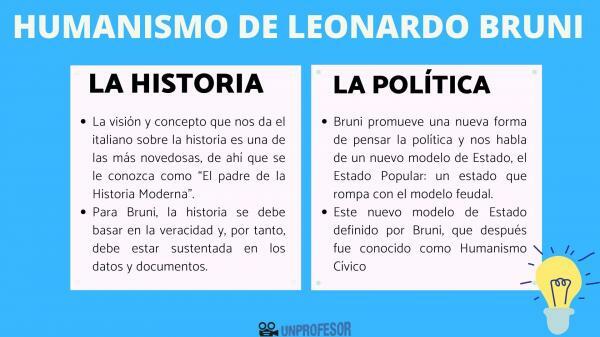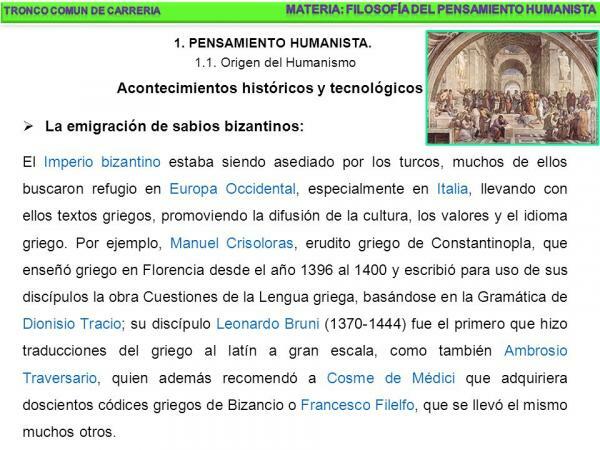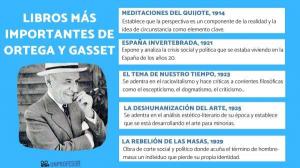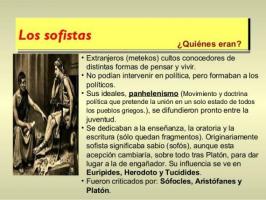Leonardo Bruni and humanism

In this lesson we are going to talk about the humanism of Leonardo Bruni (1369-1444), one of the most important philosophers, translators and historians of the Late Middle Ages / Early Renaissance and whose work, History of the Florentine people (1473), marked before and after in the conception of the history and political philosophy. Giving rise to what was defined as civic humanism or what for him would be the Popular State and the perfect government: The one that left aside the ecclesiastical / medieval institutions and in which the citizen participation prevailed, having republican Rome as a mirror.
Do you want to know more about Bruni's thinking? Keep reading because in a PROFESSOR we offer you a summary on Leonardo Bruni and humanism.
To understand 100% the thought of Leonardo Bruni and humanism, we first have to contextualize the moment in which his life and work unfolds. Specifically, it takes place in the republic of the city-state of Florence at the beginning of the Renaissance, when humanism was taking its first steps.
Bruni was born in Arezzo in 1370 (Italy), but would soon move with his family to the city of Florence, place to which he would be linked until his death and the place where he was in direct contact with other humanists, What: Coluccio Salutati (of whom he was a disciple), Niccolo Nicolli, Palla Strozzi and Manuel Crisoloras. Likewise, he stood out as a politician: first in Rome at the service of Pope Innocent VII (1405) and later as Chancellor of Florence (1427-1444).
In this way, Bruni's life passed in a Florence in full social, economic and cultural splendor. A city that had broken with its medieval past and that was moving towards a new stage.
Bruni's Florence
Since the 11th century the cities of northern Italy, among which Florence stood out, had a different development from the rest of Europe and, little by little, they became mighty city-states, independent and with a republican self-government. In this way, during the XI-XIV centuries, Florence stood out for its prosperity and economic independence (textile trade, the issuance of own bonds and letters of credit), for its progressive distancing from the empire and for the development of republican institutions own.
Now, we must bear in mind that it was never a democracy with full participation, as we conceive it today, but it was always in the hands of guilds, noble families or bankers. That is, it was configured as a oligarchy that broke with feudalism and in which Bruni was the main actor as chancellor, forming part of what became known as “lto humanist chancellery": A republic governed by equals that later began to be governed by a few through the electoral manipulation of families such as the Medici.
Humanism and Florence
Florence was one of the main stages of the Humanism and went considered "The new Athens"It was the place where great humanists such as Dante, Petrarca, Boccacio, Michelangelo, Machiavelli, Leonardo Da Vinci and Leonardo Bruni himself developed.
This movement was a breakup and a change of mind that spanned all areas of thought. He brought with him a new conception of the world (universal anthropocentrism versus medieval theocentrism), of the man (is the center), the development of the critical spirit, reason or optimism in the face of pessimism medieval. As well as, the diffusion of the classic works and, in it, had a lot to do translator work of Leonardo de Bruni, who translated the works of Aristotle, Homer, Plato, Xenophon or Demosthenes from Greek into Latin.

Image: Slideplayer
Leonardo Bruni's contributions to humanism are clearly reflected in his masterpiece History of the Florentine people (1473) and is based on two fundamental pillars, its concept of history and political philosophy:
The story according to Bruni
The vision and concept that the Italian gives us about history is one of the most innovative, hence he is known as "The father of Modern History”. Thus, for him, history must be based on the following precepts:
- It must be based on truthfulness and, therefore, must be supported by data and documents.
- The historian must be critical, abandon his speech and his opinion on the fact that he narrates. He thus he must narrate and explain the facts chronologically.
- It must be secular and leave aside the idea of Providence, since history is the result of the actions of individuals, its main actors.
- History has the purpose of teaching a people their past to understand their present.
Similarly, another of Bruni's great contributions is its tripartite division of history. It is the first to chronologically differentiate three historical periods: the Ancient Age, the Middle Ages and the Modern Age.
Politics according to Bruni
Bruni promotes a new way of thinking about politics and talks about a new model of the State, the Popular State. A state that breaks with the feudal model, that ends the dominance of a lord and that is based on the equality and freedom of citizens:
“Our way of governing the State aims to achieve freedom and equality for each and every citizen. Because it is egalitarian in all aspects, it is called popular government. We do not tremble before any lord nor are we dominated by the power of a few. We all enjoy the same freedom, governed only by law and free from fear of individuals. They all have the same hope of achieving honors and improving their condition, provided they are industrious, talented, and have a sober way of life. Well, our city requires virtue and honesty in its citizens... This is true freedom and equality in a city: not to be afraid of the power of anyone or to fear that they will harm us; to experience the equality of the law among citizens and the same opportunity to govern the State... Thus, the only legitimate way to govern the State is the popular one "
This new model of State defined by Bruni, which later became known as Civic Humanism, is based on four main ideas:
- A greater role of the citizen in the political activity of the city. That he is a participant in the decisions, that he can give his opinion and criticize.
- A greater deployment of the social freedoms of the individual and promoting the value of the public sphere.
- Enhance civic engagement: promote social and community values, such as tolerance and cooperation in politics.
- Strengthen social capital: develop the capacity of citizens to be able to face all kinds of political, social and civic issues.




